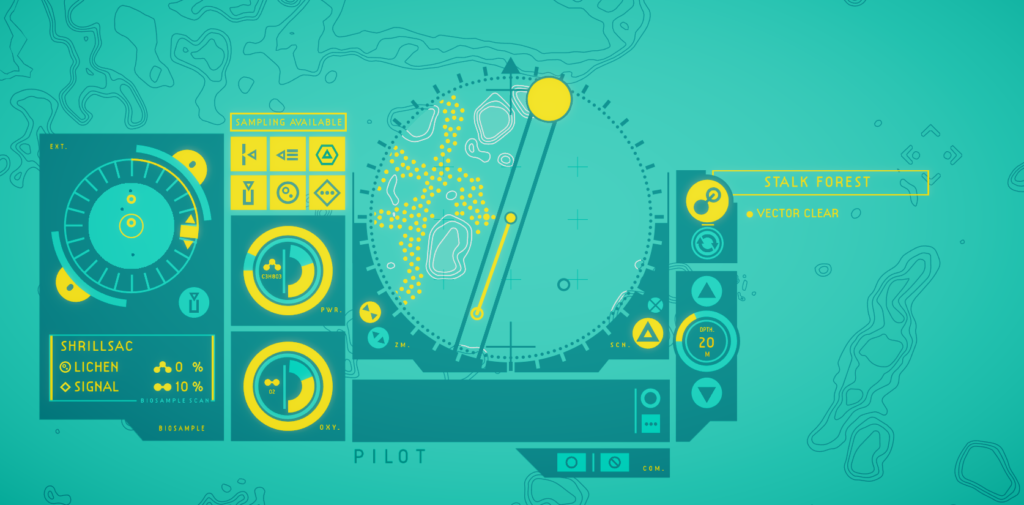
by Meaghan Walker
The video game In Other Waters is at first glance about exploring a water-based planet called Gliese 667Cc. The protagonist Ellery Vas is a disgraced contractor-xenobiologist for the company Baikal and begins to classify the new life she encounters while looking for her missing colleague Minae Nomura. The game is played through a top-down HUD, where the player is in control of Ellery’s dive suit. The game mostly consists of moving her incrementally around the alien world using waypoints. At certain places other actions can be performed, like taking a bio-sample for the game’s taxonomy. Oxygen and power management is an important mechanic as Ellery meets hostile ecosystems and wildlife.

While In Other Waters is set in the future in the year 2216, the game’s plot is built around historical questions of what happened to Minae and the planet more broadly. This is a story about the dangers of humanity’s broader impact on the universe once the climate crisis makes Earth uninhabitable and questions the viability of interstellar capitalism and colonialism. Historians of the environment, science, and of science-fiction will find a lot of interest in this game, especially in how the developers position science v. capitalist resource extraction.
And this is where the game stumbles: it centers European classification-based science as superior to, and a solution to combat capitalism and colonialism. Ellery, born in the Azores, classifies the flora and fauna of this new world, hoping that by amplifying its “discovery” she can protect the planet from the Earth’s fate.
The developers attempt to show science as a process of reconciliation. Instead, they fail to recognize that science was also a tool of conquest and subjugation. Historians of the Canadian North, as one example among many, will find a lot of parallels in In Other Waters with the scientific goals of the failed Franklin Expedition, the removal of Inuit and First Nations peoples from land marked for resource extraction, the belittlement and destruction of Indigenous knowledge, the remaking of landscapes to suit colonial tastes, and the ensuing environmental disasters which follow(ed) mines and dams. Because of these current and past traumas, current historians and scientists must work carefully and considerately with people who know the cost of extractive “research” and who have learned to distrust classifications which makes them better known to academics, administrators and investors and not to themselves.
In Other Waters is a beautiful and haunting game about humanity’s second chance on an unknown and unclassified planet teaming with sea-life. It will remind players of games like FTL in terms of visual style and sound design, and perhaps even Horizon: Zero Dawn with its themes of human knowledge-creation, capitalist failure and environmental disaster. For professors, In Other Waters could facilitate interesting class discussions if paired with papers on environmental and science history. For historical gamers, it is compelling visually and thematically, with an optimistic outlook on human possibility, if not the future of the planet.









